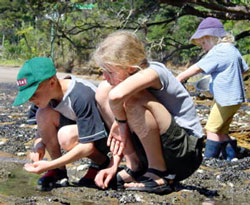
The Hokianga Accord and option4 teams jointly submitted against the proposals because seaweeds need protection from exploitation as they are at the base of the aquatic food chain. They are very highly valued in ecological, environmental, social and cultural terms.
Recently there have been several MFish papers relating to various forms of seaweed - attached, free-floating and beach-cast.
This particular proposal relates to attached Bladder Kelp, which is alive, still connected to a reef or structure and growing.
Also, the question is only about whether Bladder Kelp ought to be introduced into the quota management system in October 2010. If the answer is yes, the Ministry will consult on commercial catch limits next year.
MFish acknowledge that attached Bladder Kelp plays a critical role in coastal, inshore and estuarine ecosystems and that it provides for food, shelter and habitats for a wide range of fish and shellfish species. Kelp beds also play an important role in modifying the coastal environment by influencing water temperature, clarity, wave action and tidal movements.
Forest & Bird, Wellington recreational fishers and Te Ngaru Roa a Maui of Raglan, have all expressed their concerns about the introduction of Bladder Kelp into the quota management system.
While it might be administratively convenient to manage Bladder Kelp Seaweed within the quota system, the Accord and option4 want to know what other management options are available.
If there are no other mechanisms to protect species of such cultural and ecological significance then we believe the current permit moratorium should continue until a suitable management regime is established.
The difficulty is that the quota system is designed to manage species being harvested for money, and the harvesting rights are issued in perpetuity [forever].
Our joint submission strongly disagreed with creating any private property rights for this seaweed because of its high value. It is a national resource that needs to remain in public hands.
Given the environmental, social and cultural significance of seaweeds we expect and encourage the Minister, Phil Heatley, to take a precautionary approach to managing these species.
There are a number of tools in the Fisheries Act that can be used to achieve the best outcome, including section 11. Section 12 of the Act sets out the Crown’s statutory obligations to tangata whenua in relation to species and area management.
The Minister must have particular regard to kaitiakitanga [guardianship] in relation to this natural resource on which so many species rely on for health and abundance.
Bladder Kelp Seaweed is a national taonga [treasure] that needs to be conserved so the environment can sustain itself and future generations of New Zealanders.
|





